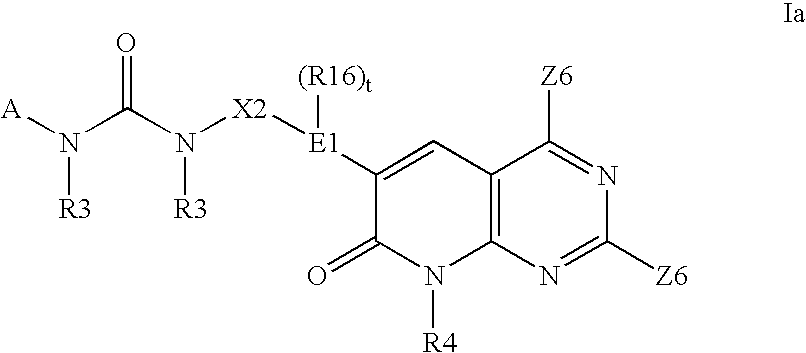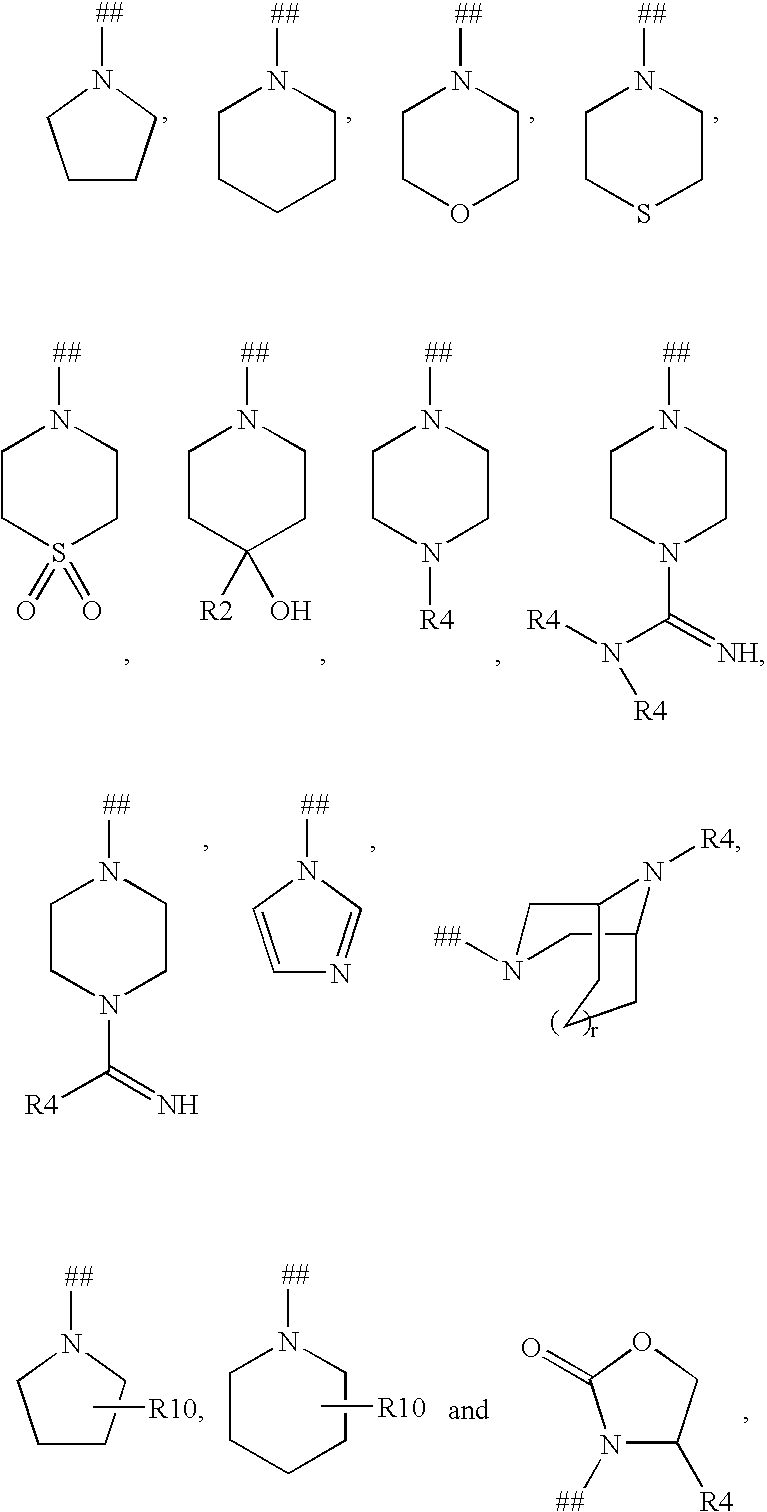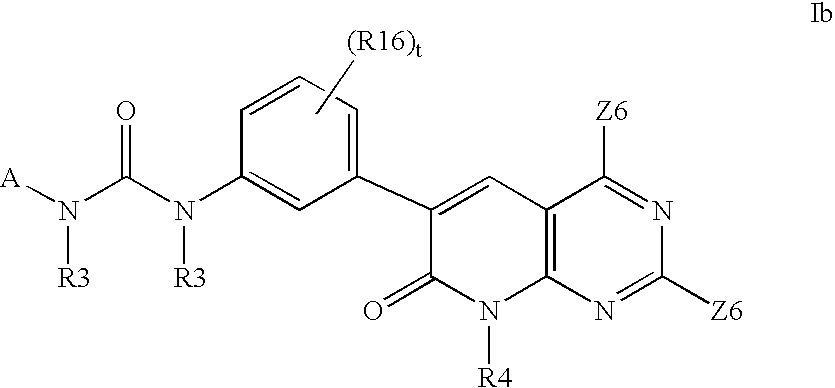Dihydropyridopyrimidinyl, dihydronaphthyidinyl and related compounds useful as kinase inhibitors for the treatment of proliferative diseases
a technology of dihydronaphthyidinyl and dihydropyrimidinyl, which is applied in the direction of antibacterial agents, transferases, immunological disorders, etc., can solve the problems of human cancer, signaling pathway dysregulation and human cancer developmen
- Summary
- Abstract
- Description
- Claims
- Application Information
AI Technical Summary
Benefits of technology
Problems solved by technology
Method used
Image
Examples
example a1
[0311]To a solution of Example A3 (6.0 g, 19 mmol) in CH2Cl2 (50 mL) was added m-chloroperoxybenzoic acid (mCPBA, 6.5 g, 38 mmol) in one portion. After stirring for 2 h at RT, sat. aq NaHCO3 and aq NaHSO3 solution were added and stirring was continued for a few minutes. The combined organic layer was washed with brine, dried and concentrated in vacuo. The residue was dissolved in DMSO (5 mL) and ammonia in dioxane (2 M, 200 mL, 400 mmol) was added. The resultant reaction mixture was stirred overnight at RT. The solvent was removed under reduced pressure and the residue was purified by reverse phase prep-HPLC to provide 2-amino-6-(3-amino-4-fluorophenyl)-8-methylpyrido[2,3-d]pyrimidin-7(8H)-one (1.9 g, 35% yield). 1H NMR (300 MHz, DMSO-d6), δ 8.63 (s, 1 H), 7.80 (s, 1 H), 7.39 (br s, 2 H), 7.12 (d, J=6.0 Hz, 1 H), 7.03 (t, J=12.0 Hz, 1 H), 6.80 (m, 1 H), 3.53 (s, 3 H); MS (ESI) m / z: 286.2 (M+H+).
example a2
[0312]Using a procedure analogous to Example A1, Example A9 (3.50 g, 10.6 mmol) was oxidized with mCPBA (2.87 g, 11.7 mmol, 70% wt) to afford the intermediate 6-(3-amino-4-fluorophenyl)-8-ethyl-2-(methylsulfinyl)pyrido[2,3-d]pyrimidin-7(8H)-one (2.35 g, 61% yield). The intermediate (1.40 g, 3.86 mmol) and 0.5 M ammonia in dioxane (15.5 mL, 2 eq) were combined and purified by silica gel column chromatography to obtain 2-amino-6-(3-amino-4-fluorophenyl)-8-ethylpyrido[2,3-d]pyrimidin-7(8H)-one (0.65 g, 56% yield). 1H NMR (400 MHz, DMSO-d6): δ 8.63 (s, 1H), 7.79 (s, 1H), 7.27 (s, 1H), 7.10 (dd, J=2.4, 8.8 Hz, 1H), 7.00 (dd, J=8.8, 11.6 Hz, 1H), 6.75 (m, 1H), 5.14 (s, 2H), 4.31 (q, J=6.8 Hz, 2H), 1.18 (t, J=6.8 Hz, 3H); LC-MS (EI) m / z: 300.0 (M+H+).
example a3
[0313]A mixture of Example C1 (15 g, 82 mmol), ethyl 2-(3-amino-4-fluorophenyl)acetate (19.4 g, 98 mmol; prepared by the method of Kuse et al. Tetrahedron (2005), 61, 5754-5762) and K2CO3 (34.0 g, 246 mmol) in DMF (100 mL) was heated at 110° C. overnight. The mixture was poured into water and product was extracted with ethyl acetate (3×200 mL). The combined organics were washed with brine, dried (Na2SO4) and concentrated in vacuo. Purification by silica gel chromatography provided 6-(3-amino-4-fluorophenyl)-8-methyl-2-(methylthio)pyrido[2,3-d]pyrimidin-7(8H)-one (13.0 g, 50% yield). 1H NMR (300 MHz, DMSO-d6), ε 8.91 (s, 1 H), 7.99 (s, 1 H), 7.15 (dd, J=8.7, 2.1 Hz, 1 H), 7.04 (dd, J=11.4, 8.4, 1 H), 6.80 (m, 1 H), 5.21 (br s, 2 H), 3.65 (s, 3 H), 2.60 (s, 3 H); MS (ESI) m / z: 317.2 (M+H+).
PUM
 Login to View More
Login to View More Abstract
Description
Claims
Application Information
 Login to View More
Login to View More - R&D
- Intellectual Property
- Life Sciences
- Materials
- Tech Scout
- Unparalleled Data Quality
- Higher Quality Content
- 60% Fewer Hallucinations
Browse by: Latest US Patents, China's latest patents, Technical Efficacy Thesaurus, Application Domain, Technology Topic, Popular Technical Reports.
© 2025 PatSnap. All rights reserved.Legal|Privacy policy|Modern Slavery Act Transparency Statement|Sitemap|About US| Contact US: help@patsnap.com



